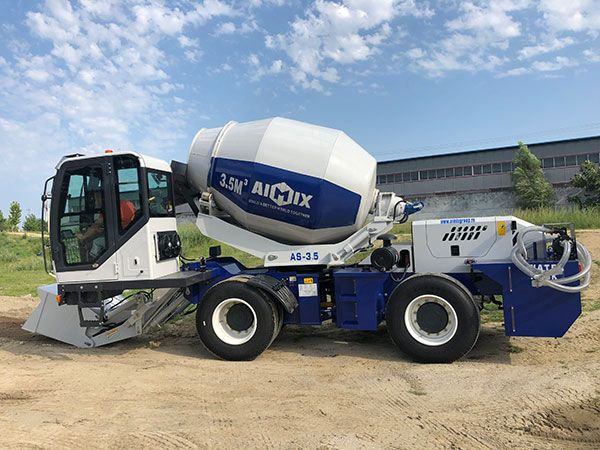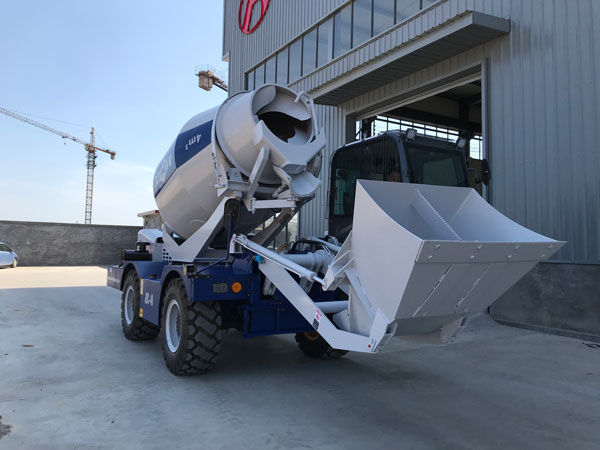Key Factors to Consider When Investing in a Self-Loading Concrete Mixer
- aimixglobal2024
- 2024年9月19日
- 讀畢需時 3 分鐘
Investing in a self-loading concrete mixer can significantly enhance your construction project's efficiency. However, making the right choice involves careful consideration. This article discusses key factors to consider when investing in a self-loading concrete mixer. These insights will help you make an informed decision, ensuring value for your investment.

Capacity and Size
The capacity and size of the mixer are crucial factors. Choose a mixer that meets your project's concrete volume requirements. Different projects require different amounts of concrete, so understanding your needs is essential.
Small Projects
For small projects, a mixer with a lower capacity will suffice. These mixers are easier to maneuver and ideal for confined spaces. They typically range from 1.2 to 2.0 cubic meters in capacity.
Large Projects
Larger projects demand mixers with higher capacities. These mixers can handle more concrete, reducing the need for frequent refills. Capacities for large projects usually range from 4.0 to 6.5 cubic meters.
Engine Power
Engine power determines the efficiency and performance of the mixer. A powerful engine ensures that the mixer operates smoothly and can handle heavy loads.
Diesel Engines
Diesel engines are common in self-loading mixers. They offer robust performance and longevity. Choose a self loading truck mixer with a diesel engine if you need reliable power for extensive operations.
Electric Engines
Electric engines are quieter and more environmentally friendly. They are suitable for projects where noise levels and emissions need to be minimized. However, they may not provide the same power as diesel engines.

Mobility and Maneuverability
Mobility and maneuverability are essential, especially for projects with limited space. Consider the mixer’s design and how easily it can navigate your construction site.
Compact Design
A compact design allows the mixer to access tight spaces. This is particularly useful for urban or residential projects where space is limited.
All-Terrain Capability
All-terrain capability ensures the mixer can operate on various surfaces, including rough or uneven ground. This feature is essential for rural or off-road construction sites.
Mixing Efficiency
Mixing efficiency directly impacts the quality of the concrete. A mixer that produces a consistent and high-quality mix is crucial for any construction project.
Drum Design
The drum design affects mixing efficiency. Look for a mixer with a well-designed drum that ensures thorough and even mixing.
Mixing Speed
Mixing speed also plays a role in efficiency. A mixer with adjustable mixing speeds allows you to control the consistency of the concrete.
Ease of Operation
Ease of operation is another important factor. A user-friendly mixer reduces the learning curve and increases productivity.
Control Panel
A well-designed control panel simplifies the operation. Look for mixers with intuitive controls that are easy to understand and use.
Maintenance Accessibility
Maintenance accessibility ensures that routine checks and repairs are straightforward. This minimizes downtime and keeps the mixer in optimal condition.
Cost and Return on Investment
Cost is always a major consideration. However, it's important to look at the return on investment (ROI) rather than just the initial price.
Initial Investment
Consider the initial cost of the mixer. While a lower price might be tempting, it’s crucial to ensure that the mixer meets all your needs.
Long-Term Savings
A quality mixer might have a higher upfront cost but can save money in the long run. Efficient mixers reduce labor costs and operational downtime, providing better ROI.
Brand Reputation and Support
Lastly, consider the brand's reputation and the level of support they offer. A reputable brand provides reliable products and excellent customer service.
Warranty and Service
Check the warranty and service options. A good warranty and readily available service centers ensure that any issues can be quickly resolved.
Customer Reviews
Customer reviews provide insights into the performance and reliability of the mixer. Look for feedback from other users to gauge the quality of the product.
Conclusion
Investing in a self-loading concrete mixer requires careful consideration of various factors. Capacity, engine power, mobility, and mixing efficiency are all crucial. Ease of operation and maintenance accessibility also play significant roles. While cost is important, focus on the long-term ROI. Finally, choose a reputable brand that offers good support. Equip your construction projects with the right self-loading concrete mixer for enhanced efficiency and success.



留言